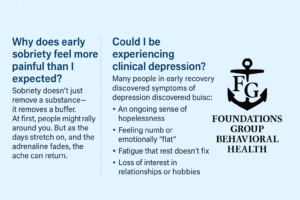Even after the hardest part is behind you, loneliness can settle in like fog on a quiet morning. You’re doing everything “right,” but it still feels heavy. If you’ve been asking, “Why do I feel worse the longer I’m sober?”—you’re not broken. And you’re not alone.
This blog explores what’s happening beneath the surface—and how depression treatment in Cape Cod, MA can help support both your healing and your humanity.
Why does early sobriety feel more painful than I expected?
Sobriety doesn’t just remove a substance—it removes a buffer. That buffer might’ve dulled anxiety, numbed grief, softened the loneliness, or flattened the noise in your head. Without it, all of that returns with full volume.
At first, people might rally around you. You might feel a rush of clarity or even pride. But as the days stretch on, and the adrenaline fades, the ache can return. Sometimes sharper than before.
One client told us, “It was like everyone else got to move on, but I was stuck alone with my thoughts.”
This is common. And it’s why support beyond detox or day one is essential.
Could I be experiencing clinical depression?
Yes—and you wouldn’t be the only one. Many people in early recovery discover symptoms of depression that were masked by substance use. These include:
- An ongoing sense of hopelessness
- Feeling numb or emotionally “flat”
- Fatigue that rest doesn’t fix
- Loss of interest in relationships or hobbies
- Trouble concentrating or making decisions
- Feeling like a burden—or like life just doesn’t matter
What matters most isn’t the diagnosis. It’s the reality that your suffering deserves support.
What’s the connection between sobriety and depression?
Substances often serve a function—even when they’re destructive. They might help someone feel alive, feel less, sleep, focus, escape, or connect. When that crutch disappears, it’s not just the withdrawal that stings—it’s the loss of what it used to do for you.
And while your brain begins to re-regulate after substance use, mood chemicals like serotonin and dopamine can be out of balance. This isn’t a character flaw. It’s biology. And it’s something that depression treatment can address.
How can I tell if it’s depression or just early sobriety adjustment?
Here’s a helpful distinction: emotional discomfort is part of adjustment. But ongoing despair—especially when it feels stuck, heavy, or isolating—may point to something deeper.
If any of this sounds familiar, depression may be playing a role:
- You’ve stopped reaching out or showing up
- You feel like no one would notice if you disappeared
- You wake up dreading the day—even when there’s nothing “wrong”
- You can’t remember the last time you felt joy
These aren’t just rough days. They’re invitations to care for your mental health, too.
Is it okay to seek depression treatment while newly sober?
Absolutely. In fact, it’s one of the most powerful ways to stay sober.
There’s a myth that you have to be “stable” before seeking mental health treatment—but in truth, many people need both at the same time. That’s why co-occurring treatment exists. It’s not a luxury; it’s a lifeline.
One outpatient client shared, “I didn’t feel strong enough for therapy at first. But depression treatment didn’t ask me to be strong—it just asked me to show up.”
What does depression treatment look like?
At Foundations Group Behavioral Health, our depression treatment services in Cape Cod, MA are designed for people just like you—people navigating the fragile, brave terrain of early sobriety.
You won’t be judged. You won’t be rushed. You’ll be met with warmth and evidence-based support, which may include:
- Individual therapy, including CBT, DBT, or trauma-informed modalities
- Group therapy with others navigating similar emotions
- Medication evaluation and management with licensed providers
- Mind-body therapies, like movement, breathwork, or art
We don’t just treat symptoms. We honor the whole person—your story, your pain, your hope.
Will treatment take over my life?
Not at all. Many people start with outpatient depression treatment that fits alongside work, school, or family commitments.
If you’re local to Barnstable County or Falmouth, we offer flexible scheduling and personalized care. We know that recovery doesn’t always look like stepping away from life—it often looks like learning how to stay in your life while healing.
What if I can’t explain how I feel?
You don’t have to. Therapists trained in depression treatment understand that language often comes after the emotion. You can start with:
- “I feel off.”
- “Everything feels hard.”
- “I don’t know what I feel.”
That’s more than enough. From there, a trained clinician can help you build language, insight, and coping tools at a pace that honors your emotional state.
“I walked in thinking I had to know what to say. Turns out, just showing up was the hardest part—and I’d already done it.”
– Depression Treatment Client, 2023
Will I lose progress in sobriety if I focus on mental health?
Not at all. In fact, untreated depression can be one of the biggest triggers for relapse.
Think of sobriety like a house. Removing the substance is like clearing out the wreckage. But if the foundation (your mental health) is cracked or unstable, the structure stays shaky. Depression treatment is how we strengthen that base—so you can build a life that actually feels good to stay in.
What if I feel like giving up?
Then this paragraph is for you.
It’s okay to feel tired. It’s okay to feel like you’re doing everything right and still feel wrong. But you don’t have to stay there. You don’t have to earn your way to relief. You’re allowed to get help now—not once it gets worse.
Let yourself be helped. Let yourself be seen. There’s care that doesn’t expect you to smile through the ache.
Looking for Depression Treatment in Cape Cod, MA?
Whether you live in Falmouth, Sandwich, or anywhere across the Cape, compassionate help is close by. Foundations Group Behavioral Health offers depression treatment designed with early recovery in mind.
We’ll meet you gently. We’ll listen. And we’ll help you take your next step—no matter how small it feels.
Call to Begin
You deserve support that matches your courage. Depression treatment is not a detour—it’s part of recovery.
Call 888-685-9730 or visit our Depression treatment program in Cape Cod, MA to learn more.









